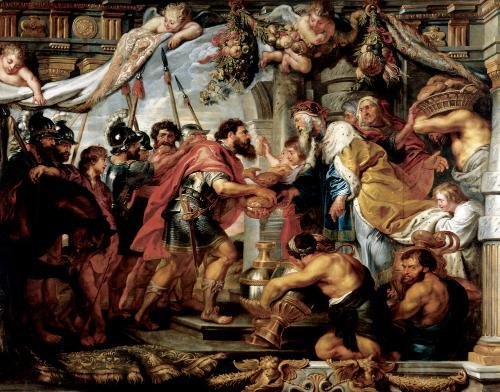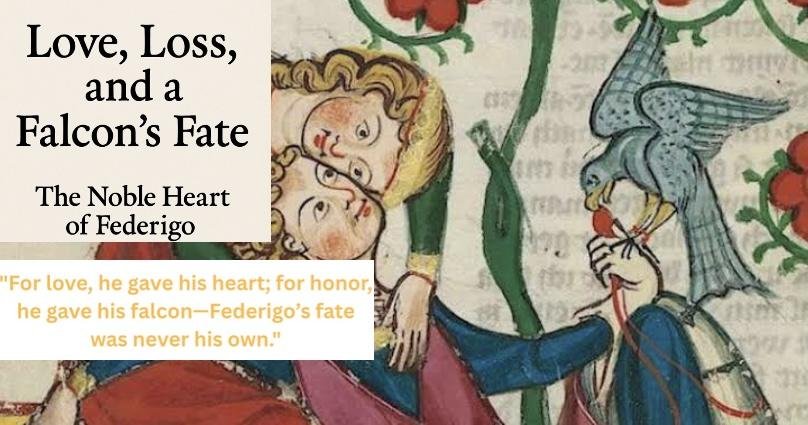"A Falcon for a Heart: The Tragedy and Triumph of True Love"

Introduction:
Giovanni Boccaccio’s The Decameron, written in the 14th century, is a rich tapestry of one hundred tales told by a group of young people seeking refuge from the Black Death. These stories, ranging from the humorous to the tragic, reflect the complexities of human nature and society during a time of crisis. Among the many memorable tales in this collection is “The Tale of Federigo’s Falcon,” a story that exemplifies themes of love, sacrifice, virtue, and irony. This particular narrative stands out not only for its emotional depth but also for the subtle commentary it offers on social values, human dignity, and the meaning of true nobility. Through the characters of Federigo and Monna Giovanna, Boccaccio explores the transformative power of sincere love and selfless acts, making the tale both timeless and profoundly moving.
Summary:
"The Tale of Federigo’s Falcon” recounts the tragic yet touching story of Federigo degli Alberighi, a nobleman who falls deeply in love with a lady named Monna Giovanna. To win her affection, he squanders his fortune on lavish gifts and displays. Left destitute, Federigo retires to a small farm with only his prized falcon as company. When Monna Giovanna’s son falls seriously ill and expresses a desire to have Federigo’s falcon, she visits him to ask for it. Not knowing her true intention and wishing to honor her with a worthy meal, Federigo kills the falcon and serves it to her. When she reveals her request, both are overcome with sorrow. After her son dies, Monna Giovanna, moved by Federigo’s noble character and his sacrifice, chooses to marry him despite his poverty.
Analysis:
At its core, “The Tale of Federigo’s Falcon” highlights several themes central to The Decameron: love, sacrifice, irony, and virtue. Federigo embodies the chivalric ideal—not through wealth or success, but through his moral character and sincere devotion. He is not rewarded for his love, but his actions reflect the idea that genuine nobility lies in how one behaves when they have nothing left to offer but themselves.
The story also serves as a subtle critique of courtly love. Unlike the conventional romantic tales where grand gestures win a lady’s heart, Boccaccio emphasizes quiet, humble acts of sacrifice. Federigo’s love is not manipulative or self-serving; it is patient and consistent, even in the face of rejection and hardship. This redefinition of love moves the tale away from shallow romanticism and towards a more grounded, human-centered ethic.
Irony plays a significant role in deepening the emotional impact. Federigo's falcon, the very thing Monna Giovanna comes to request to save her son, becomes the unwitting sacrifice of Federigo’s hospitality. This tragic twist both heightens the pathos and underscores the complexity of human intentions and outcomes. The falcon, once a symbol of Federigo’s pride and joy, becomes the ultimate offering in a final act of love and generosity.
Finally, Monna Giovanna’s transformation is central to the story’s resolution. Her decision to marry Federigo is not based on romantic passion but on the recognition of his unwavering virtue. It signals a shift from superficial values—such as wealth or status—to a deeper appreciation of character and integrity, which was an unusual but progressive message for Boccaccio’s time.
Personal Response:
Reading “The Tale of Federigo’s Falcon” left a strong emotional impression on me. Federigo’s quiet strength and resilience are profoundly moving. In particular, the scene in which he kills and serves the falcon is both heartbreaking and beautiful. It is the ultimate act of love—selfless, unspoken, and unrecognized until it is too late. The fact that he never boasts or complains, even after losing so much, shows a level of dignity that is rarely depicted in stories of unrequited love.
Monna Giovanna’s character initially seemed aloof and somewhat self-interested, especially in her decision to visit Federigo only when she needed something from him. However, her grief over her son and her eventual choice to honor Federigo's goodness rather than status shows growth and humility. I appreciated that her change was not driven by pity ut by genuine respect. This gave the story a sense of balance and fairness that resonated with me.
I also found the story surprisingly relevant to modern times. Today, acts of generosity and emotional vulnerability are often undervalued or mistaken for weakness. Federigo’s actions reminded me of how rare true altruism is, and how such acts often go unrecognized in the moment. His story speaks to anyone who has ever loved deeply without expecting anything in return. It shows that even when love is not immediately returned, it can still have a quiet, transformative power.
What struck me most, though, was the message that virtue is not in grand gestures or outward appearances, but in the small, sometimes painful decisions we make in our interactions with others. Federigo could have withheld the falcon or lamented his misfortunes, but instead, he acted with grace. That kind of silent nobility is what gives the tale its lasting emotional weight.
Conclusion:
“The Tale of Federigo’s Falcon” stands as one of the most touching and morally resonant stories in The Decameron. Through its exploration of love, sacrifice, irony, and human dignity, it transcends its medieval origins and speaks to universal truths. Federigo’s unwavering devotion and Monna Giovanna’s eventual recognition of his virtue create a narrative that is both emotionally compelling and morally instructive. In a world often consumed by appearances and material success, this tale reminds us that true nobility lies in character, not circumstance. It is a timeless story that continues to inspire empathy, humility, and respect for quiet acts of love.







